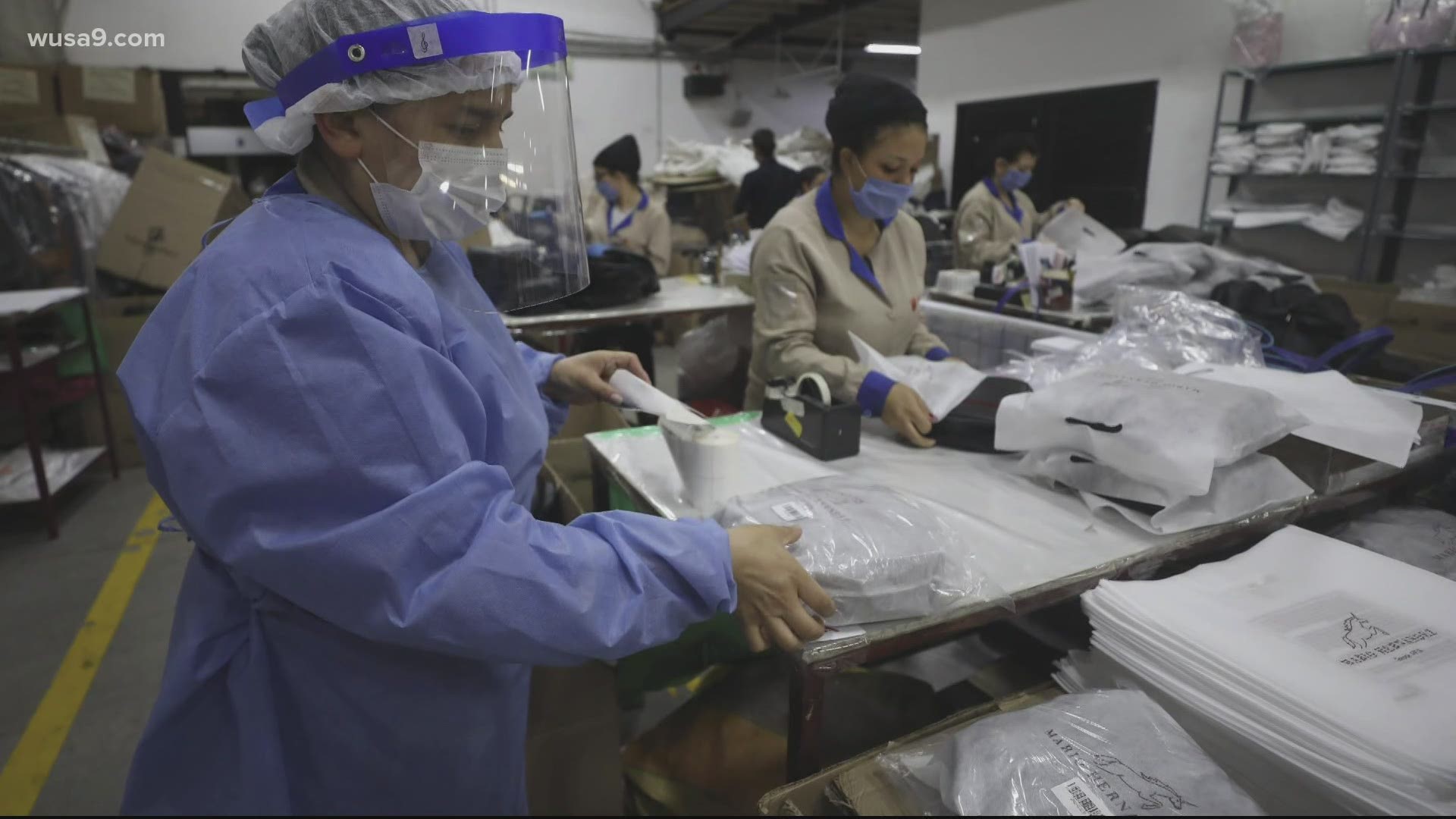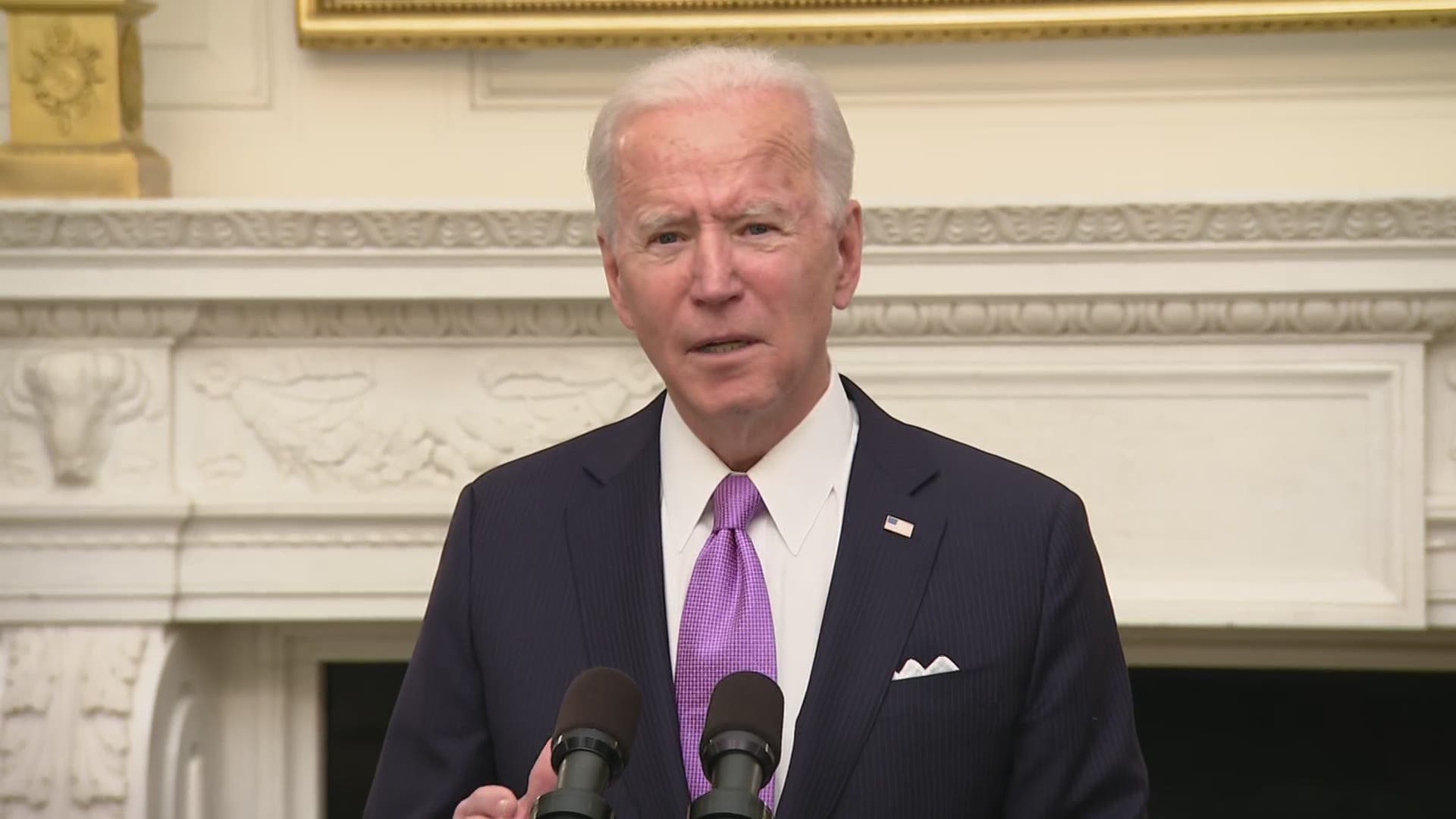WASHINGTON — The White House COVID-19 response team discussed an overview of the Defense Production Act during a briefing on Friday.
The Defense Production Act, which President Joe Biden has invoked, is a 1950 law that is expected to help boost the production of supplies needed to tackle the coronavirus pandemic. It gives the president broad authority to mobilize the resources and production of private companies to meet the needs of the national defense.
The White House says Biden is using the Defense Production Act to help bolster vaccine production, at-home coronavirus testing kits and surgical gloves.
Tim Manning, the White House’s COVID-19 supply coordinator, says the administration will help Pfizer clear a bottleneck around capabilities with vaccine production by giving the drugmaker first priority to needed supplies.
Manning says the U.S. is also investing in six manufacturers to develop at-home and point-of-care tests for the coronavirus, with the goal of producing 60 million tests by the end of the summer.
Manning says, “The country is well behind where we need to be in testing,” and the new contracts will help boost supply.
Manning expects the nation will produce more than 1 billion gloves a month by the end of the year.
To also help stop the spread of COVID-19, the Pentagon will deploy troops to assist getting Americans vaccinated against COVID-19, the White House said Friday.
Coronavirus senior adviser Andy Slavitt announced that Defense Secretary Lloyd Austin has approved a request for assistance from the Federal Emergency Management Agency. It means about 1,000 active duty military personnel will deploy to help state vaccination centers.
President Joe Biden has called for setting up 100 mass vaccination centers around the country within a month. Two are opening in California, and Slavitt said military personnel will arrive at those centers in a little over a week.
The Pentagon has scheduled a news briefing later Friday to provide more information about the military role.
A look at the Defense Production Act:
WHAT IT DOES
The act gives the federal government broad authority to direct private companies to meet the needs of the national defense.
Over the decades, the law’s powers have been understood to encompass not only times of war but also domestic emergency preparedness and recovery from terrorist attacks and natural disasters.
The act authorizes the president to require companies to prioritize government contracts and orders seen as necessary for the national defense, with the goal of ensuring that the private sector is producing enough goods needed to meet a war effort or other national emergency.
It also authorizes the president to use loans, direct purchases and other incentives to increase production of critical goods and essential materials.
Other provisions authorize the federal government to establish voluntary agreements with private industry and to block foreign mergers and acquisitions seen as harmful to national security.
WHAT IS THE FOCUS?
White House spokeswoman Jen Psaki said processes are “ongoing” to use the Cold War-era provision to boost vaccine supplies.
Biden’s national strategy for combatting the pandemic, released on Thursday during his first full day in office, puts the effort into context.
“The national vaccination effort will be one of the greatest operational challenges America has ever faced," the document says. "To ensure all Americans can be vaccinated quickly, the president has developed a plan for expanding vaccine manufacturing and purchasing COVID-19 vaccine doses for the U.S. population by fully leveraging contract authorities, including the Defense Production Act.”
Psaki told reporters the president "absolutely remains committed to invoking the Defense Production Act in order to get the supply and the materials needed to get the vaccine out to Americans across the country.”
Acquisition of specialized syringes is also on the White House's mind.
Psaki said these “low dead volume” syringes allow pharmacists and vaccinators to ensure more of the vaccine is used in a shot, “making more doses available, of course.” More ordinary syringes can leave fluid in the needle and in the space between the plunger and the syringe hub.
As of Friday, just under 5% had received one dose and fewer than 1% of the American population had been fully vaccinated.
The video below is from President Biden's first day in office on Jan. 20, 2021, when he said he would be implementing the defense production act to get supplies for coronavirus response.


